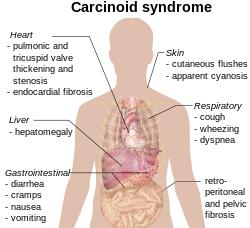Pathology definition - Carcinoid syndrome

Carcinoid syndrome.
The common complication of carcinoid syndrome may include right sided heart failure and endocarditis as a consequences of right sided valvular heart disease ( pulmonary valve and tricuspid valve). Other signs and symptoms of carcinoid syndrome are facial flushing, recurrent attack of watery diarrhea and bronchospasm which leads to asthma.
Carcinoid syndrome only affect 1 % of carcinoid tumor patient. Carcinoid tumor is the form of tumor which commonly affecting the appendix ( tumor of the appendix). Carcinoid syndrome usually caused by the release of serotonin from the carcinoid tumor.
Carcinoid tumors carrie a good prognosis with 5 year survival is around 90%.Characteristically there will be an elevation of the 5 HIAA level in the urine.
Carcinoid tumors which affect the bowel may release serotonin that finally enter the portal circulation to be metabolized and removed. Hepatic metastases will release serotonin that enter the hepatic vein and later into the systemic circulation which lead to carcinoid syndrome.
Carcinoid tumor is presented histologically as pink granular cytoplasm with stippled nucleus tumor cells. Carcinoid tumor is originating from the neuroendocrine cells of the gastrointestinal tract. Carcinoid tumor usually present as yellowish, tan intramural, submucosal mass that present in the appendix , pancreas, gallbladder, thymus, respiratory tract and reproductive organ.
The treatment of carcinoid syndrome may include symptomatic treatment such as octreotride acetate /somatostatin analogue which reduced the 5 HIAA urinary level. Histamine receptor antagonist such as cyproheptadine is used for diarrhea. Localized carcinoid tumor is treated with surgery.
References
1.Roberts, William C., and Albert Sjoerdsma. “The Cardiac Disease Associated with the Carcinoid Syndrome (carcinoid Heart Disease).” The American Journal of Medicine 36, no. 1 (January 1964): 5–34. doi:10.1016/0002-9343(64)90145-7.
2.MacDonald, Richard A. “A Study of 356 Carcinoids of the Gastrointestinal Tract: Report of Four New Cases of the Carcinoid Syndrome.” The American Journal of Medicine 21, no. 6 (December 1956): 867–878. doi:10.1016/0002-9343(56)90101-2.
The common complication of carcinoid syndrome may include right sided heart failure and endocarditis as a consequences of right sided valvular heart disease ( pulmonary valve and tricuspid valve). Other signs and symptoms of carcinoid syndrome are facial flushing, recurrent attack of watery diarrhea and bronchospasm which leads to asthma.
Carcinoid syndrome only affect 1 % of carcinoid tumor patient. Carcinoid tumor is the form of tumor which commonly affecting the appendix ( tumor of the appendix). Carcinoid syndrome usually caused by the release of serotonin from the carcinoid tumor.
Carcinoid tumors carrie a good prognosis with 5 year survival is around 90%.Characteristically there will be an elevation of the 5 HIAA level in the urine.
Carcinoid tumors which affect the bowel may release serotonin that finally enter the portal circulation to be metabolized and removed. Hepatic metastases will release serotonin that enter the hepatic vein and later into the systemic circulation which lead to carcinoid syndrome.
Carcinoid tumor is presented histologically as pink granular cytoplasm with stippled nucleus tumor cells. Carcinoid tumor is originating from the neuroendocrine cells of the gastrointestinal tract. Carcinoid tumor usually present as yellowish, tan intramural, submucosal mass that present in the appendix , pancreas, gallbladder, thymus, respiratory tract and reproductive organ.
The treatment of carcinoid syndrome may include symptomatic treatment such as octreotride acetate /somatostatin analogue which reduced the 5 HIAA urinary level. Histamine receptor antagonist such as cyproheptadine is used for diarrhea. Localized carcinoid tumor is treated with surgery.
References
1.Roberts, William C., and Albert Sjoerdsma. “The Cardiac Disease Associated with the Carcinoid Syndrome (carcinoid Heart Disease).” The American Journal of Medicine 36, no. 1 (January 1964): 5–34. doi:10.1016/0002-9343(64)90145-7.
2.MacDonald, Richard A. “A Study of 356 Carcinoids of the Gastrointestinal Tract: Report of Four New Cases of the Carcinoid Syndrome.” The American Journal of Medicine 21, no. 6 (December 1956): 867–878. doi:10.1016/0002-9343(56)90101-2.
